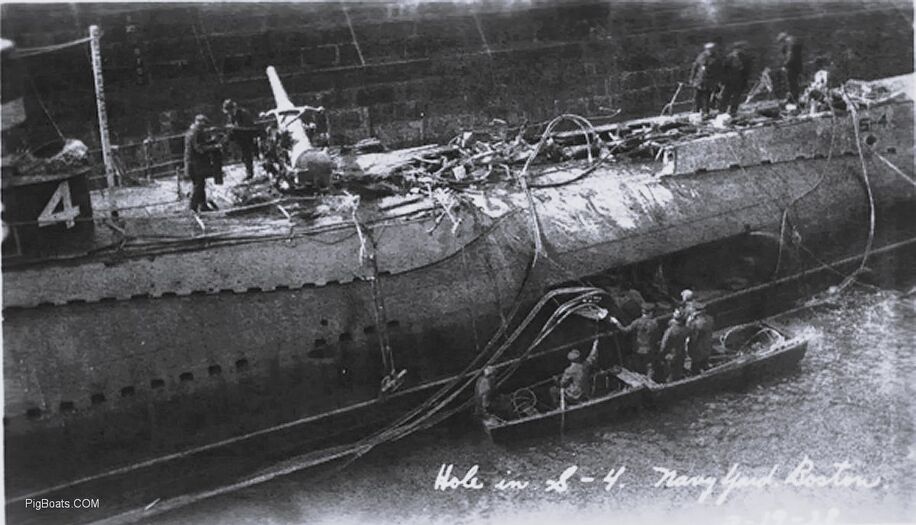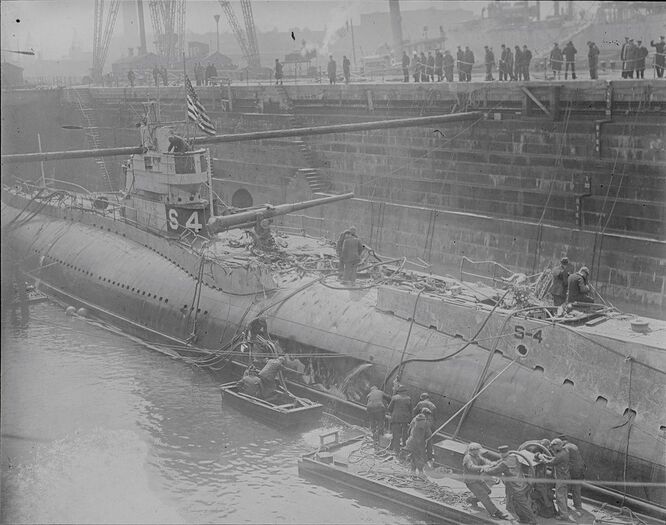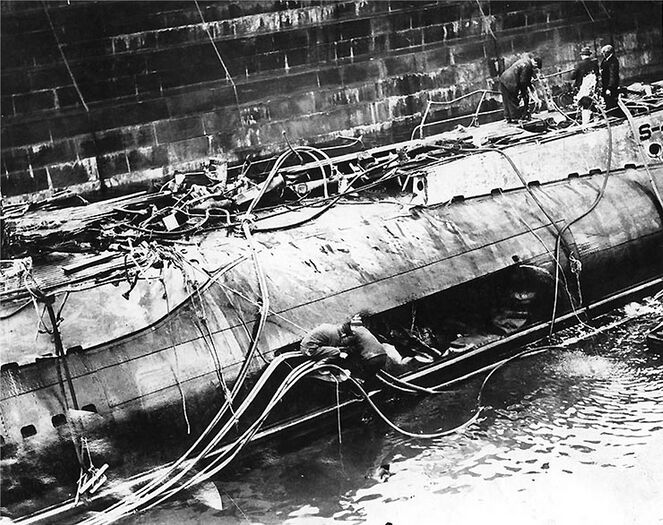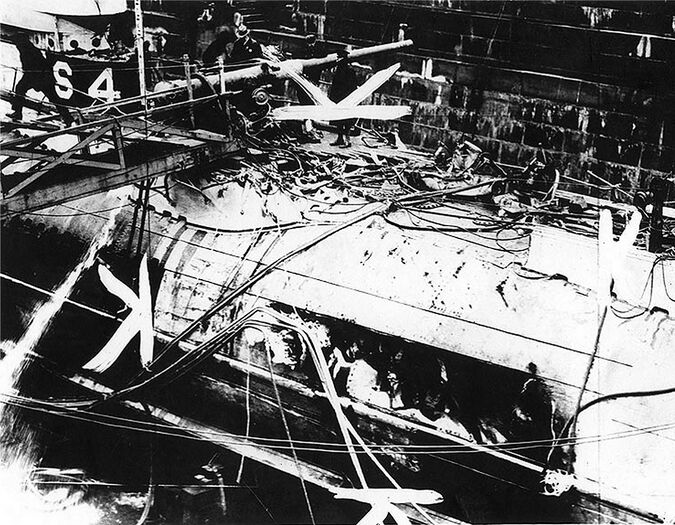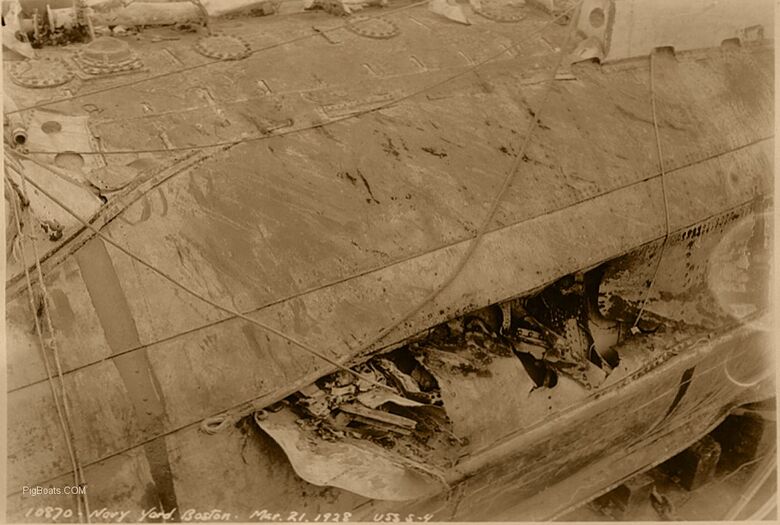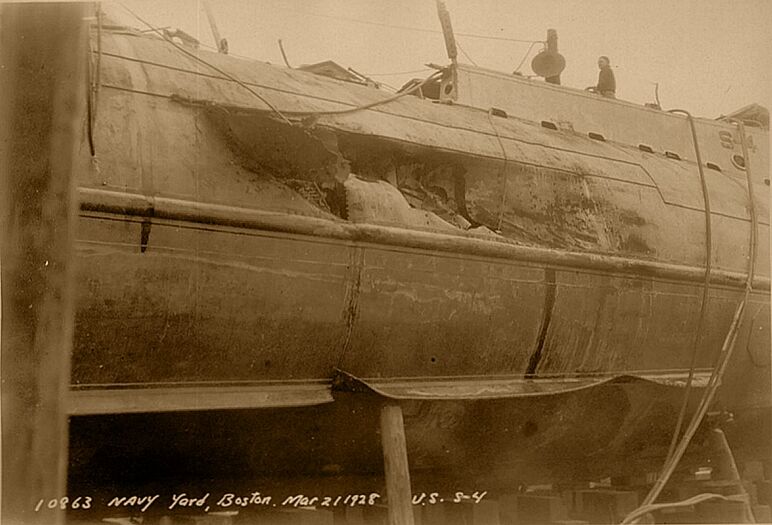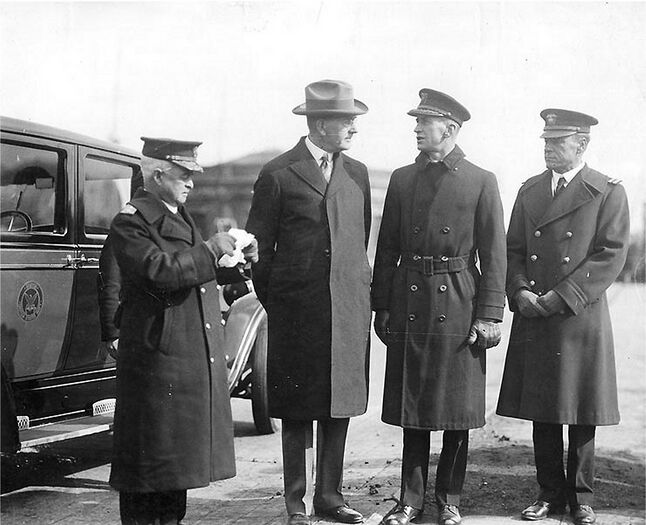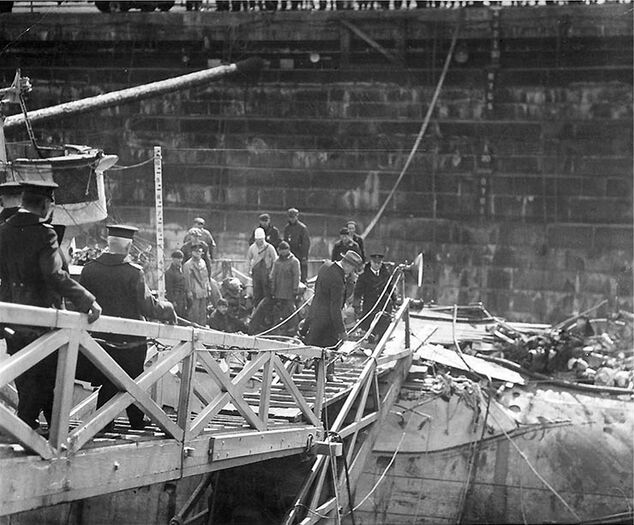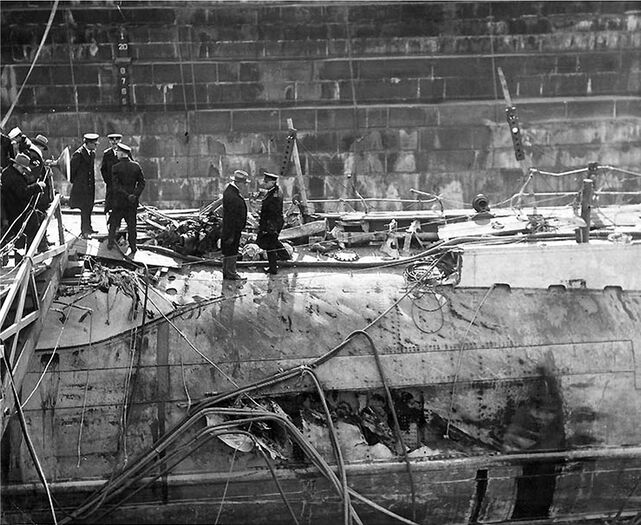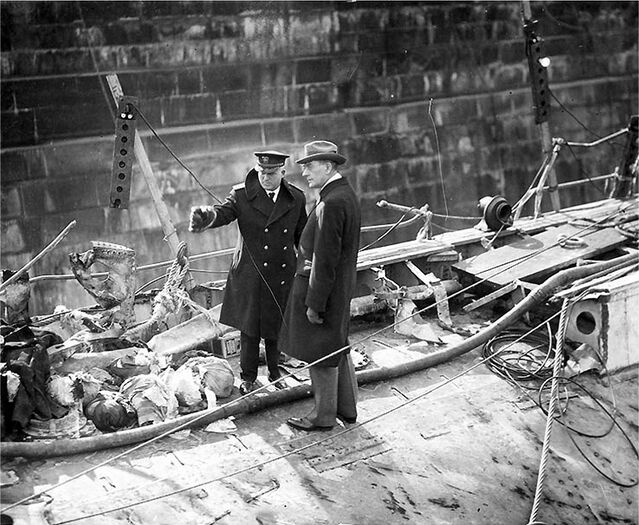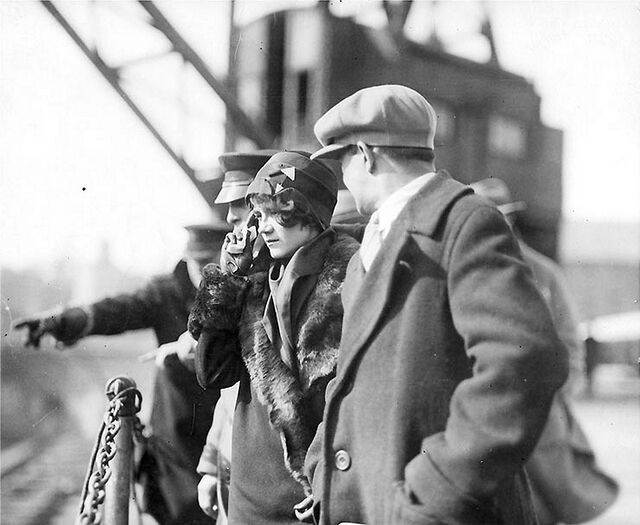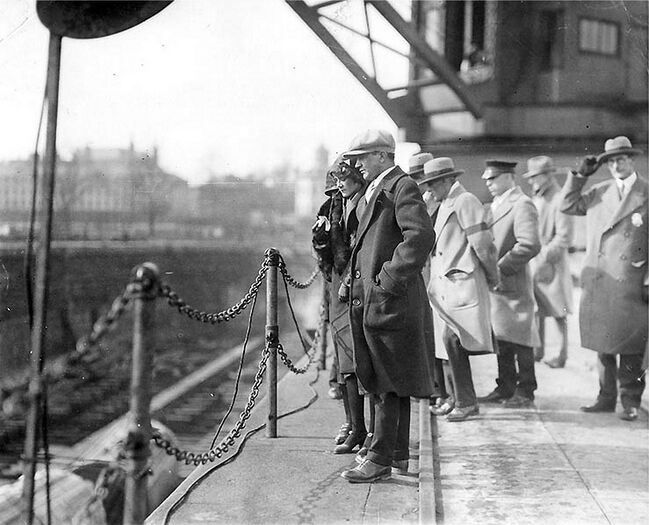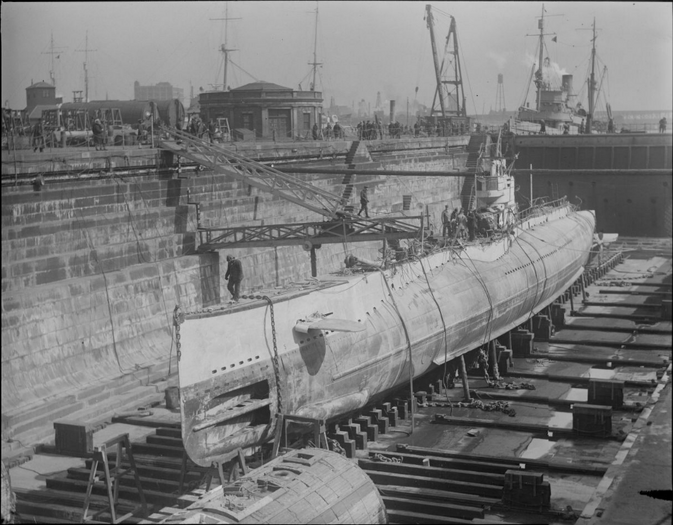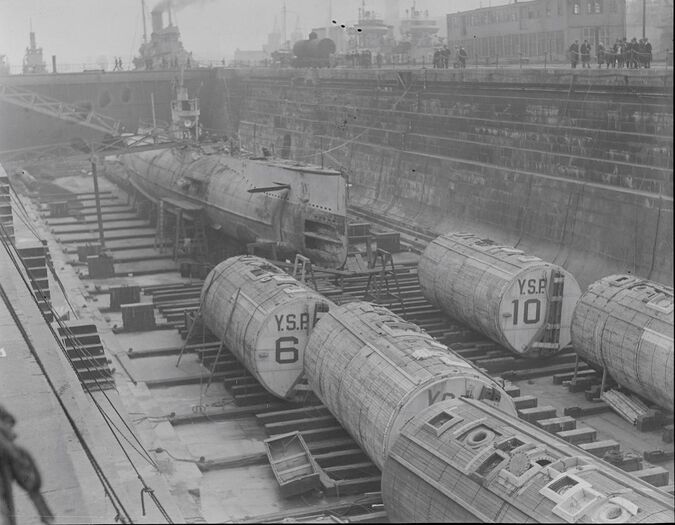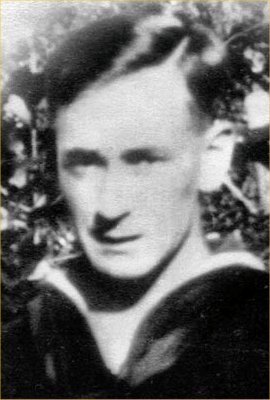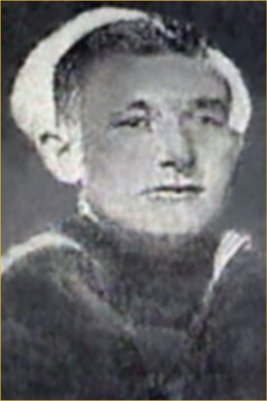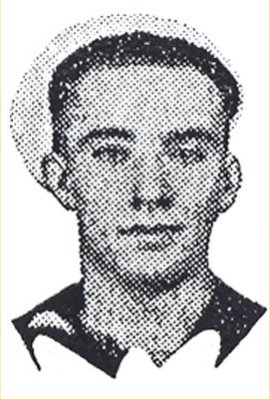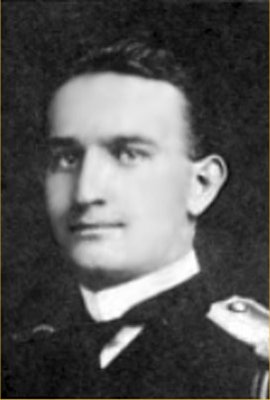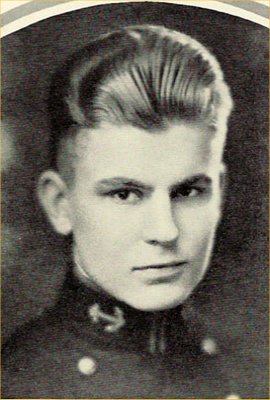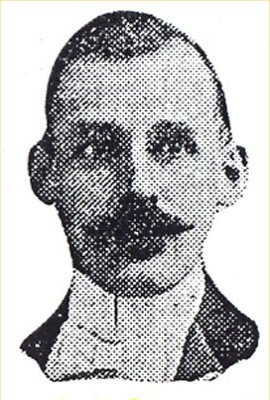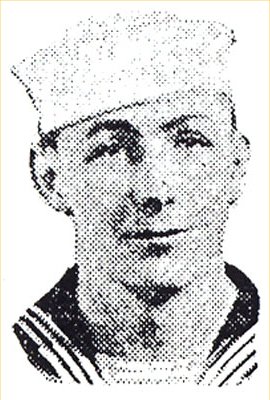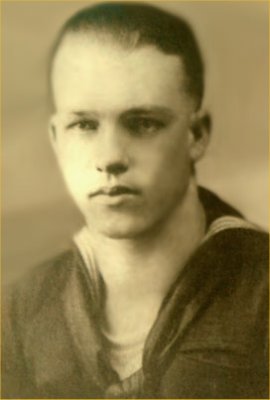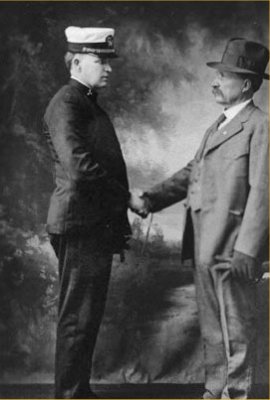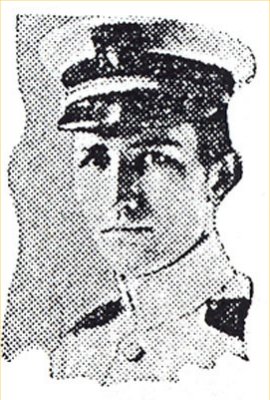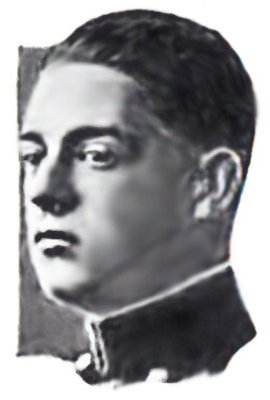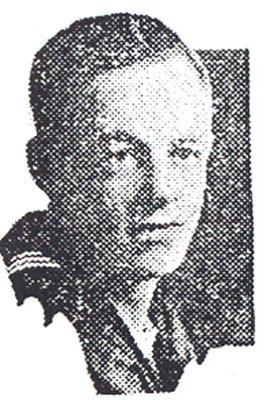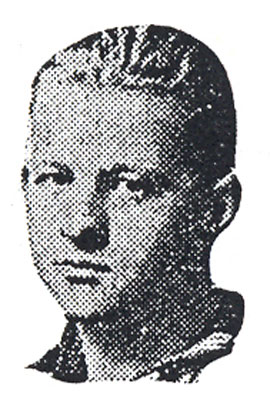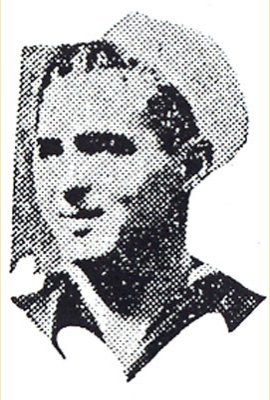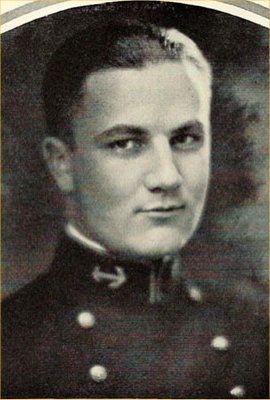S-4 salvage: Difference between revisions
Pbcjohnston (talk | contribs) Added Hartley and Eadie photo |
Pbcjohnston (talk | contribs) Added new Header |
||
| (14 intermediate revisions by 2 users not shown) | |||
| Line 1: | Line 1: | ||
[[File:S- | [[File:New Header Govt S-class.jpg]] | ||
===<big>Salvage and the voyage to Boston</big>=== | |||
[[File:S-4 pontoons 1.jpg|left|500px]] | [[File:S-4 pontoons 1.jpg|left|500px]] | ||
<div style="text-align: justify;"><span style="color:#00008B">This photo was taken at approximately 3:30 pm on March 17, 1928, shortly after the salvage force successfully raised the S-4 from the bottom of Cape Cod Bay off Provincetown, MA. The six salvage pontoons that are supporting the S-4's wreck can be seen, and in the middle is the sub's conning tower fairwater. The ship on the left is the submarine rescue vessel USS Falcon ( | <div style="text-align: justify;"><span style="color:#00008B">This photo was taken at approximately 3:30 pm on March 17, 1928, shortly after the salvage force successfully raised the S-4 from the bottom of Cape Cod Bay off Provincetown, MA. The six salvage pontoons that are supporting the S-4's wreck can be seen, and in the middle is the sub's conning tower fairwater. The ship on the left is the submarine rescue vessel USS Falcon (AM-28), the lead salvage ship of the force. She is connected to the S-4 and the pontoons via towing chains and air hoses. Compressed air had to be continuously pumped to the pontoons in order to keep them fully buoyant. The Falcon trailed the S-4 all the way back to Boston. | ||
The salvage operation went remarkably well, all things considered. The Navy had learned a lot about open ocean salvage during the [[Notable Submarine Accidents|'''S-51 operation''']] two years prior. Those lessons greatly sped the S-4 operation, and she was off the bottom in a little over three months, as opposed to the 9½ months for the S-51. | The salvage operation went remarkably well, all things considered. The Navy had learned a lot about open ocean salvage during the [[Notable Submarine Accidents|'''S-51 operation''']] two years prior. Those lessons greatly sped the S-4 operation, and she was off the bottom in a little over three months, as opposed to the 9½ months for the S-51. | ||
| Line 25: | Line 27: | ||
[[File:Red bar sub new.jpg]] | [[File:Red bar sub new.jpg]] | ||
<div style="text-align: justify;"><span style="color:#000000"> | |||
===<big>The Move into Drydock</big>=== | |||
[[File:S-4 dd 1.jpg|left|500px]] | [[File:S-4 dd 1.jpg|left|500px]] | ||
| Line 41: | Line 47: | ||
[[File:S-4 dd 3.jpg|left|500px]] | [[File:S-4 dd 3.jpg|left|500px]] | ||
<div style="text-align: justify;"><span style="color:#00008B">On the S-4 workman is beginning the process of | <div style="text-align: justify;"><span style="color:#00008B">On the S-4 a workman is beginning the process of rigging hoses so that the interior of the submarine can be pumped out, and so that the torpedo room can be ventilated prior to entry. On the raft in the background a diver is emerging from the water after inspecting the placement of the keel on the keel blocks. His helmet rests at the feet of the man with his hands in his pockets. A manual hand-cranked pump for delivering air to the diver is at the other end of the raft with the men to turn it clustered around it. | ||
<small>U.S. Navy photo.</small> | <small>U.S. Navy photo.</small> | ||
| Line 48: | Line 54: | ||
[[File:S-4 dd 4.jpg|left|500px]] | [[File:S-4 dd 4.jpg|left|500px]] | ||
<div style="text-align: justify;"><span style="color:#00008B">The actual pumping of the dock did not begin until the morning of March 19, 1928. By this point the boat is firmly on the blocks and the dock is being pumped down. The deck gun has been turned to port to allow better access to the damaged deck. Workmen are rigging pumping hoses to dewater the battery compartment directly below, as this was the only compartment that was unable to be dewatered due to the damage it received from the Paulding. The deck damage seen here was caused by the Paulding as it slid along the upper part of the hull during the collision. Of historical note in this photo is the cover that is in place over the breech end of the 4"/50 caliber gun. This cover is not seen in most photos. It was found that the breech mechanism was hardier than originally thought and that the cover was not necessary. It was deleted from most of the submarine guns that used it. | <div style="text-align: justify;"><span style="color:#00008B">The actual pumping of the dock did not begin until the morning of March 19, 1928. By this point the boat is firmly on the blocks and the dock is being pumped down. The deck gun has been turned to port to allow better access to the damaged deck. Workmen are rigging pumping hoses to dewater the battery compartment directly below, as this was the only compartment that was unable to be dewatered due to the damage it received from the Paulding. The deck damage seen here was caused by the Paulding as it slid along the upper part of the hull during the collision. | ||
Of historical note in this photo is the cover that is in place over the breech end of the 4"/50 caliber gun. This cover is not seen in most photos. It was found that the breech mechanism was hardier than originally thought and that the cover was not necessary. It was deleted from most of the submarine guns that used it. | |||
<small>Image provided courtesy of the Stephen B. Luce Library, SUNY Maritime College, Papers of John S. Baylis.</small> | <small>Image provided courtesy of the Stephen B. Luce Library, SUNY Maritime College, Papers of John S. Baylis.</small> | ||
| Line 61: | Line 69: | ||
[[File:Red bar sub new.jpg]] | [[File:Red bar sub new.jpg]] | ||
<center> | |||
<div style="text-align: justify;"><span style="color:#00008B">Enough water has been pumped out of the dock to reveal the collision damage for the first time | <gallery mode="packed" perrow=2 widths="450px" heights="350px"> | ||
File:S-4 damage 1A.jpg|<small>Image provided courtesy of the Stephen B. Luce Library, SUNY Maritime College, Papers of John S. Baylis via Joe Williams.</small> | |||
File:S-4 in drydock from starboard midships.jpg|<small>Image courtesy of the Massachusetts Digital Commonwealth.</small> | |||
</gallery> | |||
</center> | |||
<div style="text-align: justify;"><span style="color:#00008B">Enough water has been pumped out of the dock to reveal the collision damage for the first time, March 19, 1928. The unusual horizontal hole is now apparent to all personnel. In the second photo four men are furiously turning the hand pump for a diver who is below inspecting the placement of the keel blocks. The bubbles from this diver can be seen between the diving barge and the boat. | |||
[[File:Red bar sub new.jpg]] | |||
< | <div style="text-align: justify;"><span style="color:#000000"> | ||
===<big>Damage Assessment and Inspection</big>=== | |||
[[File:S-4 damage 2.jpg|left|500px]] | [[File:S-4 damage 2.jpg|left|500px]] | ||
<div style="text-align: justify;"><span style="color:#00008B">A good view of the hole in the starboard side of the S-4. The Paulding struck the S-4 at nearly head-on, and once the Paulding's forefoot broke off inside the submarine's hull, the ship slid up and over the hull and scraping it as it went past. It then struck the superstructure and | <div style="text-align: justify;"><span style="color:#00008B">A good view of the hole in the starboard side of the S-4. The Paulding struck the S-4 at nearly head-on, and once the Paulding's forefoot broke off inside the submarine's hull, the ship slid up and over the hull and scraping it as it went past. It then struck the superstructure and ripped away a large portion of it before the S-4 sank below the ship. | ||
<small> | <small>Image provided courtesy of the Stephen B. Luce Library, SUNY Maritime College, Papers of John S. Baylis via Joe Williams.</small> | ||
[[File:Red bar sub new.jpg]] | [[File:Red bar sub new.jpg]] | ||
<center> | <center> | ||
<gallery mode="packed" widths=" | <gallery mode="packed" perrow=2 widths="450px" heights="350px"> | ||
File:S-4 damage 5.jpg|<small>U.S. Navy photo.</small> | File:S-4 damage 5.jpg|<small>U.S. Navy photo.</small> | ||
File:S-4 damage 6.jpg|<small>U.S. Navy photo.</small> | File:S-4 damage 6.jpg|<small>U.S. Navy photo.</small> | ||
| Line 87: | Line 102: | ||
[[File:Red bar sub new.jpg]] | [[File:Red bar sub new.jpg]] | ||
[[File:S-4 | [[File:S-4 drydock damage assessment.jpg|left|500px]] | ||
<div style="text-align: justify;"><span style="color:#00008B">In this photo, probably taken on March 19, 1928, the dry dock is finally almost pumped free of water. Yard and Navy personnel can be seen on and under the submarine. It is draped with a profusion of lines, hoses, and pontoon lifting chains. | <div style="text-align: justify;"><span style="color:#00008B">In this photo, probably taken on March 19, 1928, the dry dock is finally almost pumped free of water. Yard and Navy personnel can be seen on and under the submarine. It is draped with a profusion of lines, hoses, and pontoon lifting chains. | ||
The long sausage looking object on the hull below the waterline beneath the bow planes is a MV sonar, a replacement for the earlier Y-tube mounted on the main deck forward. It was a line array of 12 microphones and was electronically steered. A duplicate array was on the port side. | The long sausage looking object on the hull below the waterline beneath the bow planes is a MV sonar, a replacement for the earlier Y-tube mounted on the main deck forward. It was a line array of 12 microphones and was electronically steered. A duplicate array was on the port side. | ||
<small> | <small>Photo courtesy of the Massachusetts Digital Commonwealth.</small> | ||
[[File:Red bar sub new.jpg]] | [[File:Red bar sub new.jpg]] | ||
| Line 111: | Line 126: | ||
<center> | <center> | ||
<gallery mode="packed" widths=" | <gallery mode="packed" perrow=2 widths="450px" heights="350px"> | ||
File:S-4 secnav.jpg | File:S-4 secnav.jpg | ||
File:S-4 secnav inspect.jpg | File:S-4 secnav inspect.jpg | ||
| Line 125: | Line 140: | ||
<center> | <center> | ||
<gallery mode="packed" widths=" | <gallery mode="packed" widths="450px" heights="350px"> | ||
File:S-4 widow 1.jpg | File:S-4 widow 1.jpg | ||
File:S-4 widow 2.jpg | File:S-4 widow 2.jpg | ||
| Line 136: | Line 151: | ||
[[File:Red bar sub new.jpg]] | [[File:Red bar sub new.jpg]] | ||
[[File:S-4 | [[File:S-4 remove torp.jpg|left|500px]] | ||
<div style="text-align: justify;"><span style="color:#00008B"> | <div style="text-align: justify;"><span style="color:#00008B">A Mk 10 torpedo is removed from the S-4. The weapon was pushed by hand out of the torpedo tube, where a crane gingerly picked up the weapon and moved it to the pier. How many weapons the S-4 was carrying on her final voyage is not known. | ||
<small> | <small>U.S. Navy photo.</small> | ||
[[File:Red bar sub new.jpg]] | [[File:Red bar sub new.jpg]] | ||
<center> | |||
<div style="text-align: justify;"><span style="color:#00008B"> | <gallery mode="packed" widths="450px" heights="350px"> | ||
File:S-4 in drydock from port.png | |||
File:S-4 in drydock with pontoons.jpg | |||
</gallery> | |||
</center> | |||
<div style="text-align: justify;"><span style="color:#00008B">Two more photos from the assessment phase, with most of the hoses and lines from the salvage work cleared away. The first photo shows the undamaged port side, and the second provides a good view of the salvage pontoons that were used in the salvage work. The S-4's torpedo tubes are open and the weapons stored in the torpedo room have been removed. | |||
<small> | <small>Images courtesy of the Massachusetts Digital Commonwealth.</small> | ||
[[File:Red bar sub new.jpg]] | [[File:Red bar sub new.jpg]] | ||
[[File:S-4 | [[File:S-4 damage forward deck.jpg|left|500px]] | ||
<div style="text-align: justify;"><span style="color:#00008B"> | <div style="text-align: justify;"><span style="color:#00008B">This photo was taken on March 21, 1928. The 4"/50 caliber deck gun has been removed to facilitate repairs to the boat. The collision damage to the deck and superstructure in the area of the hole, (to the left in this photo), is clearly seen. At the right side is a large electrical pump that is in use pumping water from the hull. The stanchions for the radio antennas atop the bridge are bent to port as is the periscope. The two massive poles bracing the submarine to the sides of the drydock are seen running to each side of the photo. Portable lighting has been set up to allow work into the night and provide a safe area for walking due to all the damage. The round wire mesh enclosure in the foreground is a covering for one of the main ballast tank vents. | ||
<small> | <small>Image provided courtesy of the Stephen B. Luce Library, SUNY Maritime College, Papers of John S. Baylis via Joe Williams.</small> | ||
[[File:Red bar sub new.jpg]] | [[File:Red bar sub new.jpg]] | ||
[[File:S-4 | [[File:S-4 roses.jpg|left|500px]] | ||
<div style="text-align: justify;"><span style="color:#00008B">In dry dock at the Boston Navy Yard, Charlestown, Massachusetts, circa March 21, 1928. The original caption reads: "In memory of the historic crew. A huge cross of roses, the gift of workers at the Boston Navy Yard, is tied to the periscope of the ill-fated submarine S-4, after the eight bodies were removed from the undersea craft which is now in drydock at the Boston Navy Yard." Two men are seen attaching the roses to the periscope. Note the depth marking stick placed just forward of the submarine's fairwater during salvage operations. | |||
<small> | <small>U.S. Navy photo.</small> | ||
[[File:Red bar sub new.jpg]] | [[File:Red bar sub new.jpg]] | ||
<div style="text-align: justify;"><span style="color:#000000"> | |||
===<big>Interior Photos of the Damage</big>=== | |||
[[File:S-4 battery room damage 1.jpg|left|500px]] | [[File:S-4 battery room damage 1.jpg|left|500px]] | ||
| Line 196: | Line 220: | ||
As a result of these first sinkings the doors used in submarines were redesigned smaller and heavier and existing boats were retrofitted with these over time. New submarines were designed with the smaller doors. | As a result of these first sinkings the doors used in submarines were redesigned smaller and heavier and existing boats were retrofitted with these over time. New submarines were designed with the smaller doors. | ||
<small>U.S. Navy photo.</small> | <small>U.S. Navy photo, copy in the collection of Ric Hedman.</small> | ||
[[File:Red bar sub new.jpg]] | |||
<div style="text-align: justify;"><span style="color:#000000"> | |||
===<big>The Aftermath</big>=== | |||
[[File:S-4 Bell - Falcon CO Henry Hartly-Diver Chief Thomas Eadie.jpg|left|500px]] | |||
<div style="text-align: justify;"><span style="color:#00008B">On the left is LT Henry Hartley, (holding his little dog), the commanding officer of the USS Falcon (AM-28), the principal salvage ship of the task force that raised the S-4. His expertise was instrumental in the successful salvage of the boat. On the right is Chief Gunner's Mate Thomas Eadie, one of the leading divers during the salvage effort. Eadie is a USN diving legend of unparalleled skill and bravery. He worked on many projects, including the salvage of the S-51 and the S-4. He was awarded two Navy Crosses and the Medal of Honor for his work. | |||
The two men are proudly displaying the S-4's bell, recovered from the wreck by Eadie. | |||
<small>Photo in the private collection of Ric Hedman.</small> | |||
[[File:Red bar sub new.jpg]] | [[File:Red bar sub new.jpg]] | ||
| Line 218: | Line 255: | ||
[[File:Red bar sub new.jpg]] | [[File:Red bar sub new.jpg]] | ||
[[File:S-4 repaired flooding drydock.png|left|500px]] | |||
The internal damage to the S-4 had been extensive, and the expense of fixing her up and putting her back into service could not be justified. The decision was made to conduct minimal repairs and use the boat as a test bed to develop new salvage and rescue capabilities. By October 1927 the S-4 had been made watertight again. This photo shows S-4 with a brand new patch on her hull where the damage had been. She has been cleaned up and repainted, and the sharp edges around the torn away superstructure have been removed. However, the superstructure itself has not been repaired. | |||
The flood ports on the drydock caisson have been opened and the dock is in the process of being flooded. The boat would soon be floated out for return to the fleet. She would be recommissioned, but not returned to full service. She was destined to be towed to various locations where diving, salvage, rescue, and escape technologies could be developed. | |||
Out of these new efforts, the Navy developed and put into use salvage air connections to a submarine's internal compartments, the Momsen Lung escape device, and the McCann Rescue Chamber. The sacrifice of the S-4's crew had made future submarines safer and more effective. | |||
<small>Photo courtesy of the Massachusetts Digital Commonwealth.</small> | |||
[[File:Red bar sub new.jpg]] | |||
<div style="text-align: justify;"><span style="color:#000000"> | |||
===<big>The Crew</big>=== | |||
<div style="text-align: justify;"><span style="color:#00008B"> | |||
<center> | <center> | ||
<gallery mode="packed" widths="200px" heights="300px"> | <gallery mode="packed" widths="200px" heights="300px"> | ||
| Line 242: | Line 295: | ||
<div style="text-align: justify;"><span style="color:#00008B">There were 22 other crew that we don't have images for. If you have photos of these missing men please contact On Eternal Patrol or this web page with this information. | <div style="text-align: justify;"><span style="color:#00008B">There were 22 other crew that we don't have images for. If you have photos of these missing men please contact On Eternal Patrol or this web page with this information. | ||
Other lost | Other lost crew with no photo: | ||
Clarence Ferdinand Bethke / | Clarence Ferdinand Bethke / | ||
Latest revision as of 19:05, 17 March 2025
Salvage and the voyage to Boston
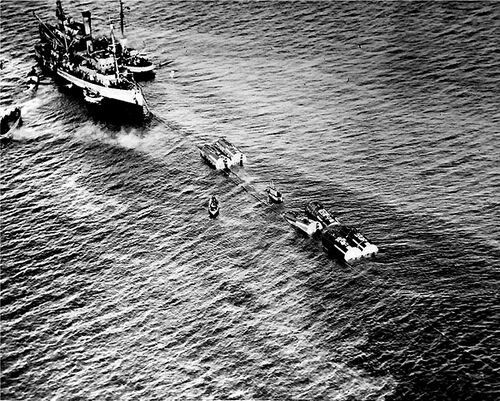
The salvage operation went remarkably well, all things considered. The Navy had learned a lot about open ocean salvage during the S-51 operation two years prior. Those lessons greatly sped the S-4 operation, and she was off the bottom in a little over three months, as opposed to the 9½ months for the S-51.
Please see the Jim Christley article at this link for the story of the S-4.
U.S. Navy photo.
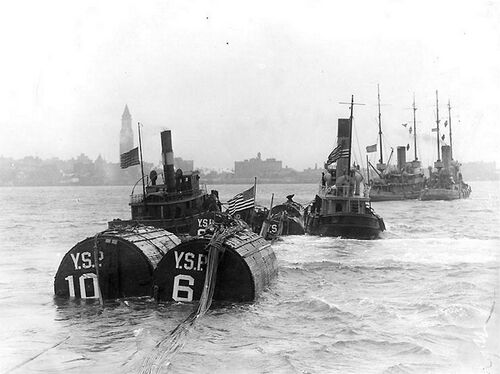
U.S. Navy photo.
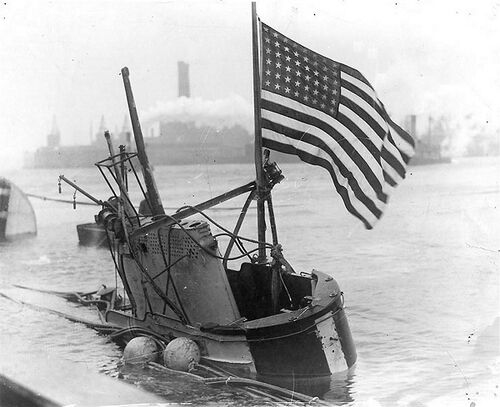
U.S. Navy photo.
The Move into Drydock
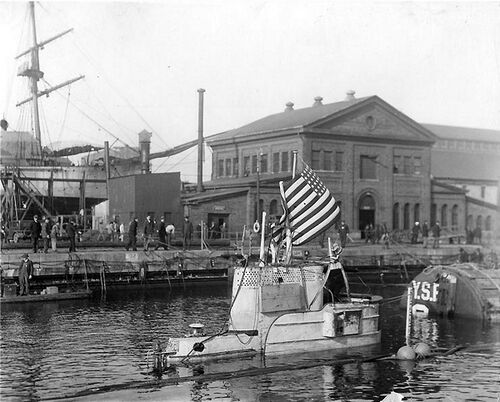
U.S. Navy photo.

U.S. Navy photo.
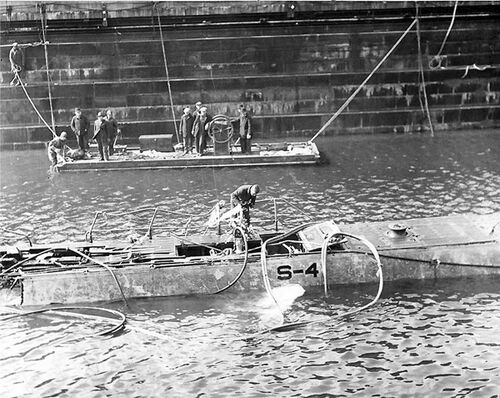
U.S. Navy photo.
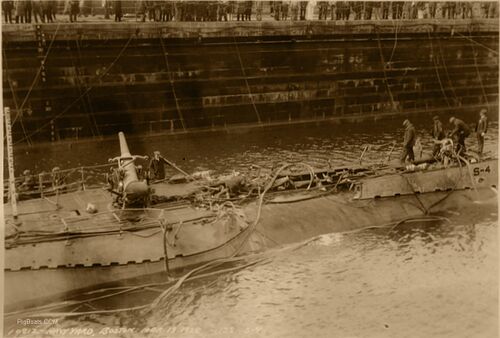
Of historical note in this photo is the cover that is in place over the breech end of the 4"/50 caliber gun. This cover is not seen in most photos. It was found that the breech mechanism was hardier than originally thought and that the cover was not necessary. It was deleted from most of the submarine guns that used it.
Image provided courtesy of the Stephen B. Luce Library, SUNY Maritime College, Papers of John S. Baylis.
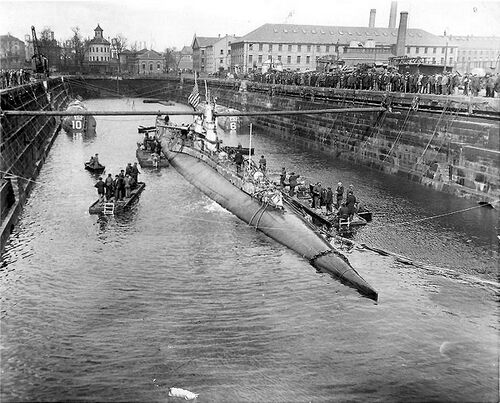
U.S. Navy photo
-
Image provided courtesy of the Stephen B. Luce Library, SUNY Maritime College, Papers of John S. Baylis via Joe Williams.
-
Image courtesy of the Massachusetts Digital Commonwealth.
Damage Assessment and Inspection
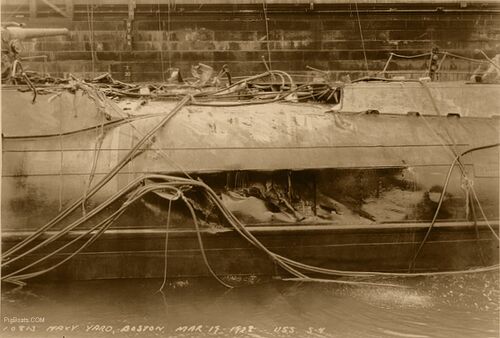
Image provided courtesy of the Stephen B. Luce Library, SUNY Maritime College, Papers of John S. Baylis via Joe Williams.
-
U.S. Navy photo.
-
U.S. Navy photo.
-
Image provided courtesy of the Stephen B. Luce Library, SUNY Maritime College, Papers of John S. Baylis via Joe Williams.
-
Image provided courtesy of the Stephen B. Luce Library, SUNY Maritime College, Papers of John S. Baylis via Joe Williams.
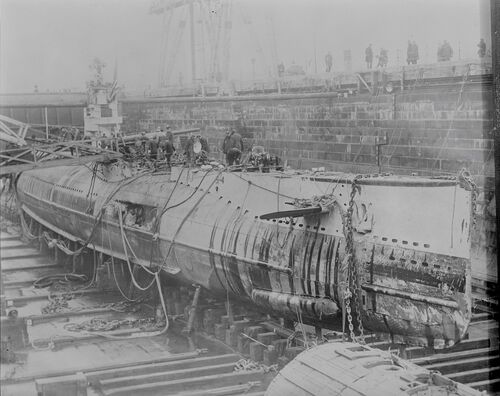
The long sausage looking object on the hull below the waterline beneath the bow planes is a MV sonar, a replacement for the earlier Y-tube mounted on the main deck forward. It was a line array of 12 microphones and was electronically steered. A duplicate array was on the port side.
Photo courtesy of the Massachusetts Digital Commonwealth.
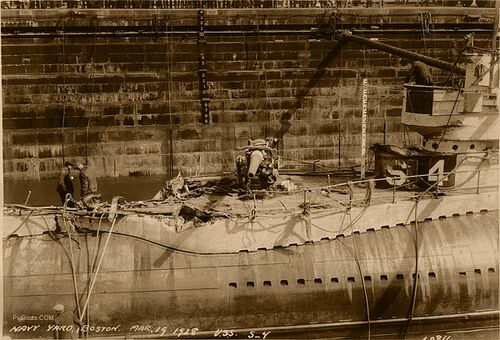
Image provided courtesy of the Stephen B. Luce Library, SUNY Maritime College, Papers of John S. Baylis via Joe Williams.
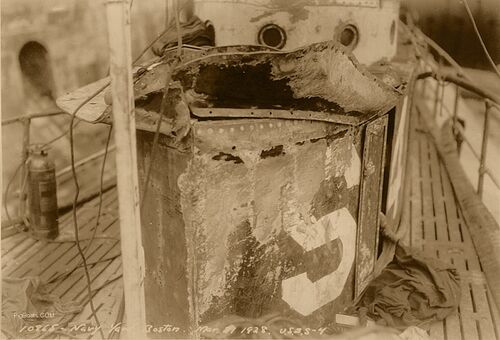
Image provided courtesy of the Stephen B. Luce Library, SUNY Maritime College, Papers of John S. Baylis via Joe Williams.
U.S. Navy photos.
U.S. Navy photos.
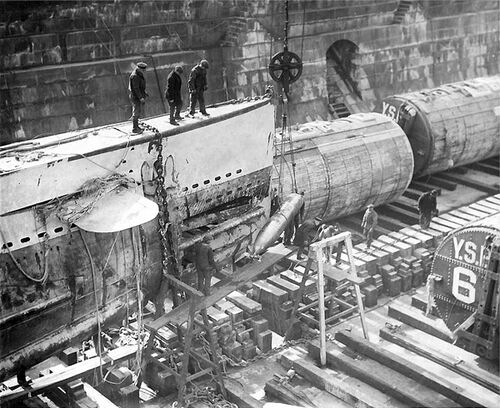
U.S. Navy photo.
Images courtesy of the Massachusetts Digital Commonwealth.
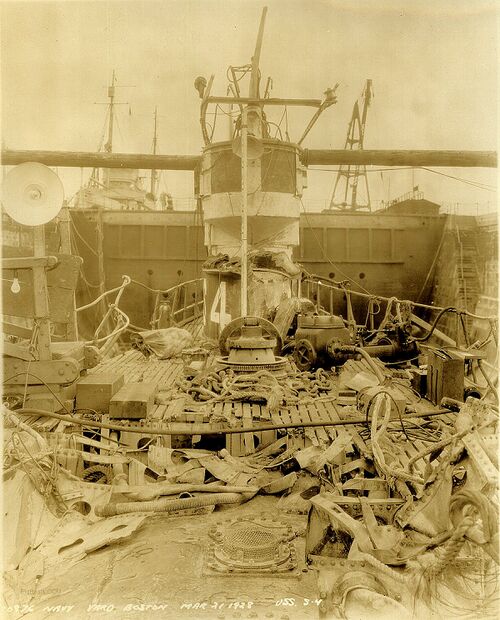
Image provided courtesy of the Stephen B. Luce Library, SUNY Maritime College, Papers of John S. Baylis via Joe Williams.
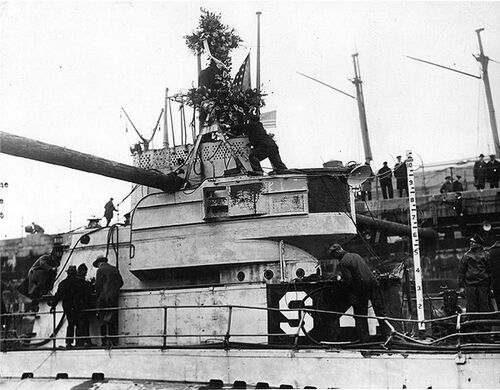
U.S. Navy photo.
Interior Photos of the Damage

S-4 flooded through a hole, made by Paulding's bow, in the forward starboard side of the Battery Room.
U.S. Navy photo.
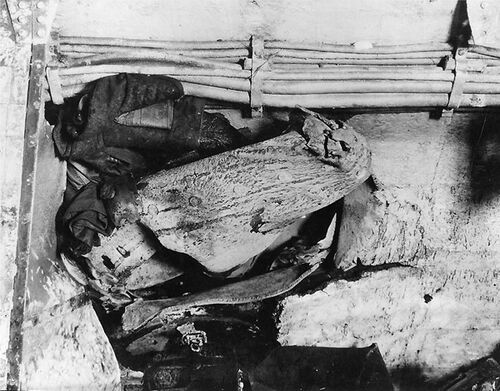
U.S. Navy photo.
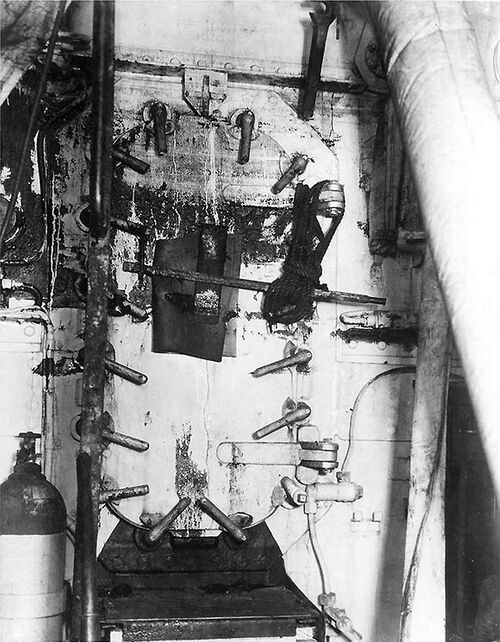
The six men in this compartment were;
Lieutenant Graham N. Fitch
Torpedoman's Mate Russell A. Crabb
Seaman Joseph L. Stevens
Seaman George Pelnar
Torpedoman's Mate Roger L. Short
Torpedoman's Mate Frank Snizek
As the trapped men used the last of available oxygen in the sub's torpedo room, a diver placed his helmeted ear to the side of the vessel and received this Morse-coded message, “Is … there … any … hope?” Unfortunately, the ultimate answer was "no". All six men died.
As a result of these first sinkings the doors used in submarines were redesigned smaller and heavier and existing boats were retrofitted with these over time. New submarines were designed with the smaller doors.
U.S. Navy photo, copy in the collection of Ric Hedman.
The Aftermath

The two men are proudly displaying the S-4's bell, recovered from the wreck by Eadie.
Photo in the private collection of Ric Hedman.
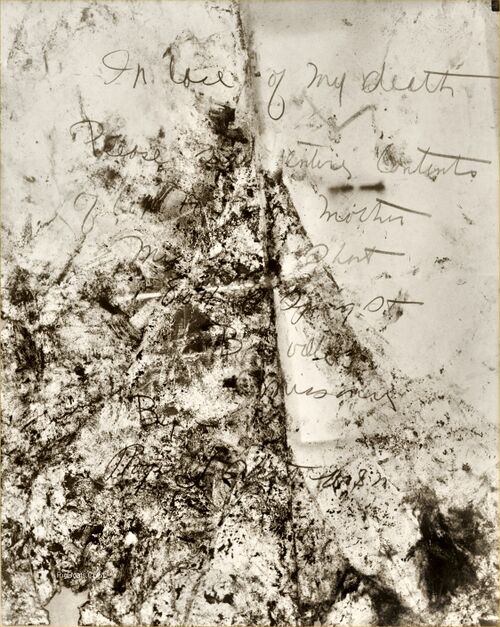
The letter says: In case of my death please send entire contents of box to my mother Mrs. (unreadable) Short 804 (unreadable) Spring St. Booneville, Missouri. By Roger L. Short U.S.N.
Courtesy of the Boston Public Library, Leslie Jones Collection.
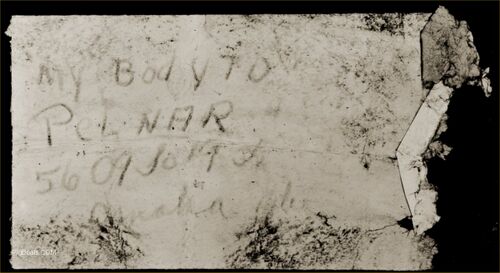
Seaman George Pelnar had only been aboard for 21 days at the time of sinking.
Courtesy of the Boston Public Library, Leslie Jones Collection.
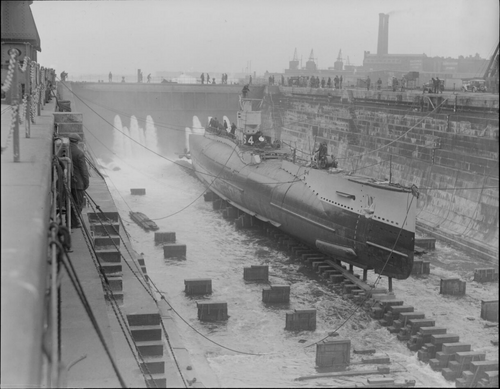
The internal damage to the S-4 had been extensive, and the expense of fixing her up and putting her back into service could not be justified. The decision was made to conduct minimal repairs and use the boat as a test bed to develop new salvage and rescue capabilities. By October 1927 the S-4 had been made watertight again. This photo shows S-4 with a brand new patch on her hull where the damage had been. She has been cleaned up and repainted, and the sharp edges around the torn away superstructure have been removed. However, the superstructure itself has not been repaired.
The flood ports on the drydock caisson have been opened and the dock is in the process of being flooded. The boat would soon be floated out for return to the fleet. She would be recommissioned, but not returned to full service. She was destined to be towed to various locations where diving, salvage, rescue, and escape technologies could be developed.
Out of these new efforts, the Navy developed and put into use salvage air connections to a submarine's internal compartments, the Momsen Lung escape device, and the McCann Rescue Chamber. The sacrifice of the S-4's crew had made future submarines safer and more effective.
Photo courtesy of the Massachusetts Digital Commonwealth.
The Crew
-
Walter Bishop
-
Henry Handy Brown
-
Charles Frederick Burrell
-
Charles Beresford Calcott
-
William Franklin Callaway
-
Graham Newell Fitch
-
Charles A. Ford / Civilian
-
Daniel Michael Gavin
-
Dewey Victor Haney
-
Aaron A. Hodges w/Uncle
-
Roy Kehlor Jones
-
Joseph Alfred McGinley
-
John Jospeh Powers
-
Roger Leslie Short
-
Frank Snizek
-
Joseph William Sternman
-
Joseph Leighton Stevens
-
Donald Weller
Other lost crew with no photo:
Clarence Ferdinand Bethke / Earl Welsh Boone / Elmer Lyfford Cash / Russell Archibald Crabb / William Dempsey / Robert William Diefenbach / John Joseph Fennell / Donald Fred Goering / Peder Haaland / Buster Harris / Arthur Frederick Hodges / Paul Richard Kempfer / J. H. Long / Fred Henry O'Shields / George Pelnar / Rudolf James Rose / Alfred Eugene Seaton / Carl Bernice Strange / Mariano Tedar / Carl Harold Thompson / Walter Ross Tolson / James Johnson White
Photos courtesy of the On Eternal Patrol website
Page created by:
Ric Hedman & David Johnston
1999 - 2023 - PigBoats.COM©
Mountlake Terrace, WA, Norfolk, VA
webmaster at pigboats dot com

